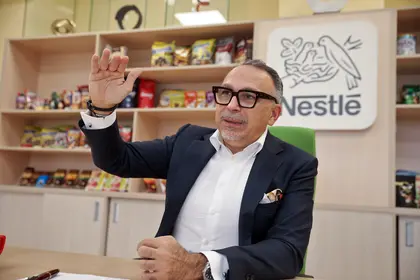International food giant Nestle is one of the most polluting brands on the planet.
The brand’s packaging results in lots of plastic waste, which gives the company a bad name. But Nestle is determined to reduce its reliance on single-use plastics, Alessandro Zanelli, CEO of Nestle Ukraine and Moldova, told the Kyiv Post.
JOIN US ON TELEGRAM
Follow our coverage of the war on the @Kyivpost_official.
The company wants to make all its packages either recyclable or reusable by 2025, which could help reduce its impact on the environment while still allowing business to grow.
“Consumers clearly understand that a good company is a company that is good for the planet,” Zanelli said.
Green activists, however, remain skeptical about whether Nestle can become a sustainable brand.
Eggshell
For the third year in a row, big brands like Coca Cola, PepsiCo and Nestle have been accused of making “zero progress” on reducing plastic waste.
The Swiss brand Nestle ranked third among the world’s plastic polluters, according to an annual audit published by the Break Free From Plastic movement in December 2020.
Plastic packaging offers a lightweight storage option that helps manufacturers control their food quality and safety. Single-use plastic bottles have also brought convenience to the world.
However, they went from miracle containers to hated garbage. Nestle alone is responsible for 95,000 tons of plastic per year worldwide, enough to cover 15 full-size football pitches every day, the NGO Tearfund’s report shows.
Nestle began as a dairy food production company in 1866. The business expanded beyond the kitchen and soon started dominating the global food industry, with more than 2,000 brands including global icons like Nescafe and Nespresso under its name, spreading plastic pollution with its single-use products.
Zanelli said the company is thinking about new ways to tackle this issue, beginning with recyclable plastic. The products may not be as attractive because they are less glossy compared to the ones made of single-use plastic, but it’s a much-needed step forward.
“In order to make all-natural (and) fully recyclable products, you lose the glossiness of the packaging,” he told the Kyiv Post. “It is a mindset change and we need to do it with the consumers.”
“The perfect packaging is an eggshell,” Zanelli said, because it’s recyclable, biodegradable and can be stored on a shelf for a long time.
Educating consumers
Since its arrival in Ukraine in 1994, Nestle acquired three local companies along with their production facilities, which include confectionery factory Svitoch, the Torchyn factory that produces sauces and noodle factory Mivina.
The Swiss brand spent about $40 million in 2021 so far to improve production facilities and make them more efficient while also focusing on sustainability, Zanelli said.
He explained that the factories in Ukraine are ranked high among all Nestle factories worldwide, exporting a lot of goods to other countries including those in the European Union.
“We are really committed to Ukraine,” Zanelli said. “We have been here for 26 years and we really enjoy doing business here.”
It also means developing an eco-friendly and sustainable policy, he said. “To be a good company, you need to be focused beyond business.”
In 2020, Nestle launched a project with the waste management company Veolia to improve access to recycling infrastructure. This project, which operates in three towns on the outskirts of Kyiv, entails the placement of 222 special containers for collecting paper, glass, metal and plastic packaging waste.
Through this project, Nestle tests out a new system to hold producers accountable for the whole packaging cycle, which Zanelli hopes other companies will adopt.
“It is very encouraging to see how we can really recycle products that would be otherwise wasted and put in a landfill somewhere,” he said.
The company also plans to reduce the quantity of paper and plastic used in its packages, making them thinner and smaller, Zanelli said.
Nestle has a long way to go. The company still uses multilayer aluminum-laminated plastics, which are difficult to recycle.
The promise to switch to recyclable packaging is an important step, said Eugeniya Aratovksa, founder and CEO of recycling movement No Waste Ukraine.
“Manufacturers, the government, consumers and recycling companies are all part of one big mission to make sure that the plastic doesn’t get left behind in the environment,” she said.
At the same time, changing packaging is not enough. Ensuring that waste is properly recycled is also critical, according to Aratovska. Unfortunately, many recyclable materials are getting tossed in the garbage instead of a recycling bin in Ukraine, which defeats their purpose, she said. At the end of the day, it’s also the consumer’s responsibility to take care of waste.
The non-profit estimates that “less than 10% or even 5% of the whole population recycles regularly,” which is far less than other European nations like Germany where approximately 66% of the population recycles according to data gathered from self-reported surveys.
Consumers started to blame manufacturers of products so businesses saw the need to help society preserve the environment before it’s too late.
“It eventually led to a situation where companies had to solve problems (of waste management) for the government,” she told the Kyiv Post.
“It’s not a normal situation (because) companies would usually be engaged in their business rather than educating people.”
You can also highlight the text and press Ctrl + Enter





